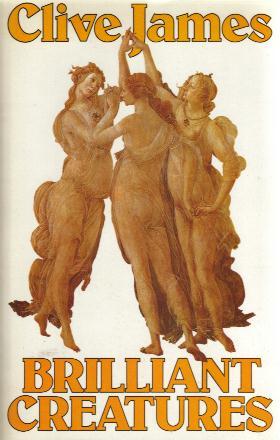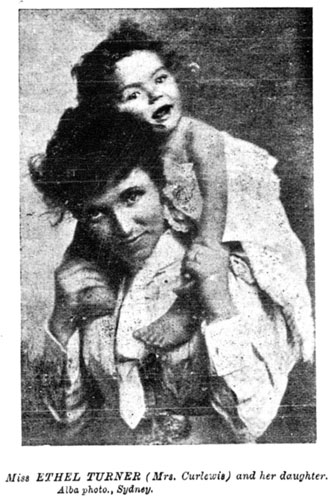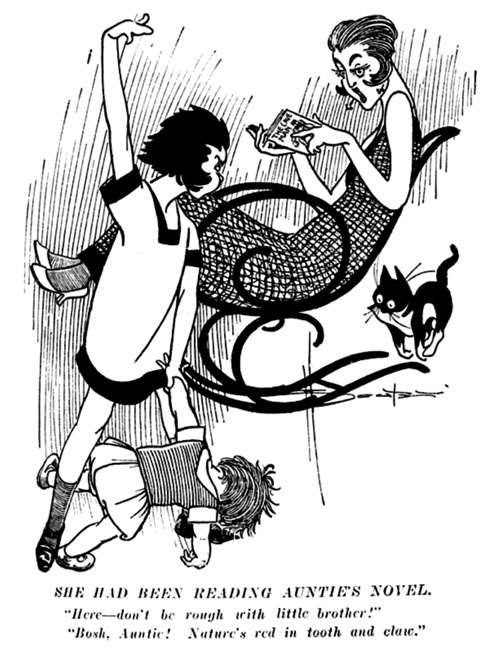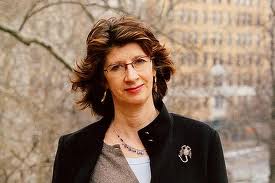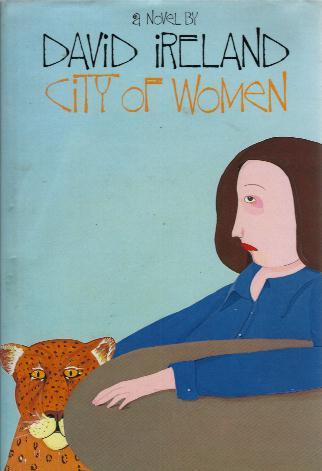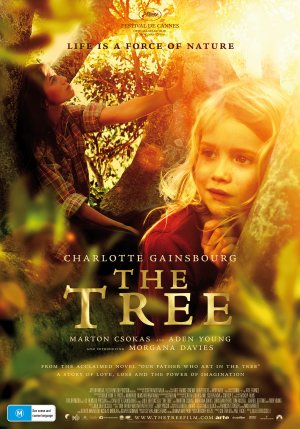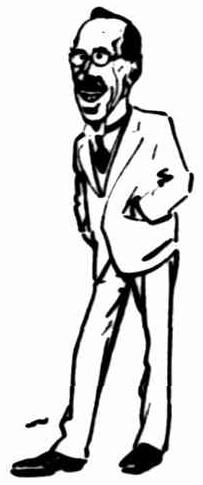A poet as editor of a daily newspaper is unlikely in the present day. But Sydney once had one, none other than A. B. Paterson, whose galloping rhymes, "The Man From Snowy River," "The Geebung Polo Club" and others, won him immense popularity. The atmosphere of the newspaper Paterson edited is conveyed in this sketch by one who breathed it. The paper was the old "Evening News," then published on the site of the State Theatre of to-day.
Banjo Paterson was my first Sydney editor on the "Evening News," for many years now in the newspaper cemetery,
His sanctum was "an office mean and dingy," a roller-top desk taking up most of the space in it. The pigeon holes were stuffed with all manner of discarded junk and the writing surface of the desk littered high with old proof sheets, out-of-date newspapers, opened and unopened, leaving him little elbow room at his near-submerged writing blotter pad.
He had an habitual look of bewilderment and how he got out that galley was indeed the inexplicable. For anyone less attuned to what the tempo of evening journalism could be would have taken some finding.
If the paper had waited for "Banjo" it would have had to be an annual. However, in a leisurely sort of way the sub-editor persuaded three, sometimes four, editions to reach the streets each day.
It was generally a one-story title and that was turned out by Tom Spencer, the star reporter who unfailingly was assigned to the day's biggest news item. (Tom was the son of the Spencer who wrote "How MacDougall Topped the Score"').
Paterson hated being left to himself. Whoever went into his room was welcomed like a long-lost brother. He would lean back comfortably in his chair as much as to say that time was no object and settle himself down for a yarn. If a man from outback came in with a cattle dog it wasn't long before the dog sensing the situation curled itself up and was asleep.
The general manager of the "Evening News" was Walter Jeffrey (?) who passed his days reading Conrad and writing himself of the sea. He had sailed before the mast and tous looked as though he would be very happy with a pot of paint, a brush and some chalking smartening up a schooner.
At peak hours of the paper he and Paterson would be together exchanging confidences of far horizons, Paterson, "the sunlit plains extended" and Jeffrey palm-fringed islands of the South Seas.
A social historian would have delighted in the atmosphere of the "Evening News" in those first few years that opened this century. The split-second speed of afternoon editors of today was unknown in the place. The paper had a comfortable supremacy in evening sales and advertising. "The Star" was far more pronouncedly moribund. There wasn't a twinkle in it.
The "News" had three leaders who wrote little essays on subjects remote from daily life and they were all them out of the office by 10 a.m.
They were a hangover from the Victorian era. Peace and humility were the established order. Hurry was indecent. Writers, such as they were, were there. Literary hacks had the shabbiness of Grubb Street and the parsimonious "Evening News" was their last refuge.
Worse days we were told had been before. The legend of Alfred Bennett, an earlier proprietor, hung heavily over the office.
But a story of an unbroken spirit of his day sustained us even in our blackest moods. It was related of the time when the building that housed the paper was being erected. Alfred Bennett was regarding the facade from across the street. He had left a niche for some symbolic figure of the power of the Press to embellish it. Pondering what it should be, he espied one of his down-at-heel reporters, whom he gruffly hailed.
"I was thinking of Caxton and his Press," he said after curtly explaining his probIem. "Perhaps some suitable coat of arms would be better. What are your views?"
"A coat of arms, I should suggest, sir," said Meyers.
"Indeed?"
"Yes, sir, I think the Earl of Warwick's arms would be most appropriate."
The Earl of Warwick's arms are The Bear with the Ragged Staff.
"Banjo" Paterson introduced a cartoonist to the "Evening News" in Lionel Lindsay (now Sir Lionel). There were thus two cartoonists of the daily Press, the other Hal Eyre, of the old "Daily Telegraph," father of the present cartoonist of "The Sydney Morning Herald."
Lindsay ran an amusing series of drawings captioned, "Places I have never visited." Rome, according to him, had its seven hills and on each he posted a barrel organ grinder with his monkey. This nearly caused an international incident. Dattillo Rubbo, a fierce artist and Garibaldian, challenged Lionel to a duel. His letter offering the choice of weapons to Lionel was a masterpiece of inflamed patriotism.
Nothing happened or occurred in the columns of the "Evening News"; everything "transpired." You could never, however you tried, or twisted syntax, avoid it. The sub-editor would have his way. At long last I had "transpire" put on the index expurgatorius. It came about by my reading a short story by Morley Roberts in which a character appeared, "like a third-rate reporter transpiring at every pore." I gave it to the sub-editor to read.
The sub-editor was a gourmand. Every banquet to which a reporter was called in Sydney he attended. No ticket for one ever got past him. He got rounder and ruddier until his doctor warned him off the perils of the table and put him on a strict diet.
He sadly told "Banjo" of the blow.
"I am not to cat cabbage, Barty," he wailed. "I'm fond of cabbage, dished up and cut across, with pepper and butter. And I'm fond of mashed potatoes, with plenty of pepper and butter. I'm ordered to have neither. I think," he added reflecting on this fate, "I can give up cabbage, Barty, but I can't, I can't (Caruso sob), I can't give up mashed potatoes!"
Paterson, his long weather beaten face lighting with that attractive, humorous smile of his, used to repeat poor W. Leighton-Bailey's tale of woe.
We all had a great affection for "Banjo." And "linesmen," of whom I was one, were glad he began life as a lawyer. For he marked our contributions with a professional fee -- a paragraph, 3/4; a short cross- head, 6/8; half a column, half a guinea; a column, a guinea.
Still, as an editor, it would occur to me how true he must have thought it that, "a bush man's life has pleasures that the townsman never knows."
First published in The Sunday Herald, 9 November 1952
[Thanks to the National Library of Australia's newspaper digitisation project for this piece.]
